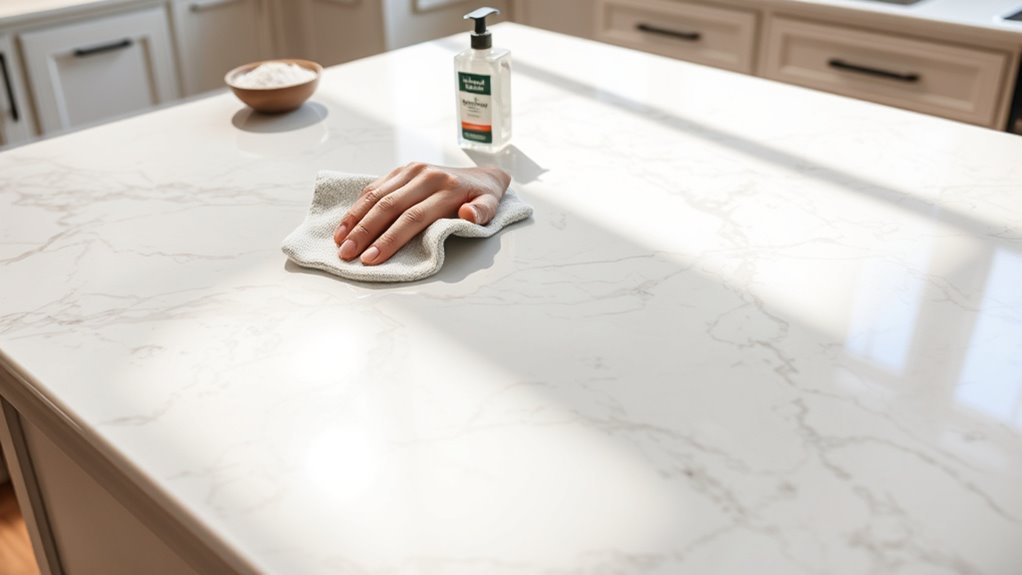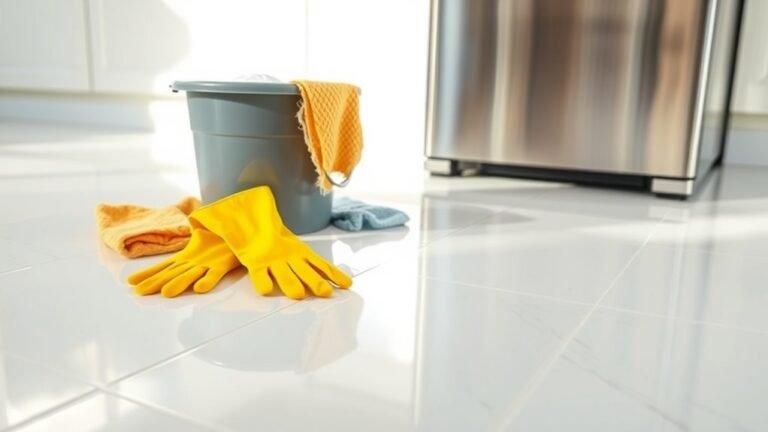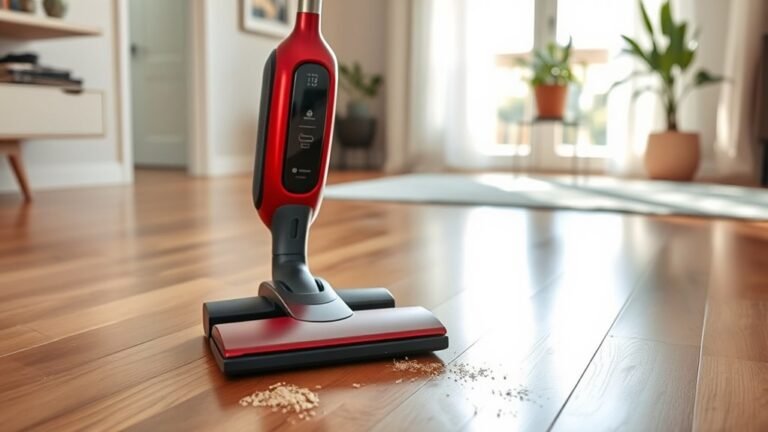How to Clean and Polish Marble Countertops
To clean and polish marble countertops, use a soft cloth with a gentle, pH-neutral cleaner or warm water and mild soap to avoid damage. Wipe spills immediately to prevent stains and etching, and dry the surface thoroughly. For stains, apply appropriate poultices or stain removers, and polish lightly with a soft cloth or buffer for shine. Protect your marble with regular sealing and avoid acidic or abrasive cleaners. Keep following for more tips on care and upkeep.
Understanding Marble and Its Vulnerabilities
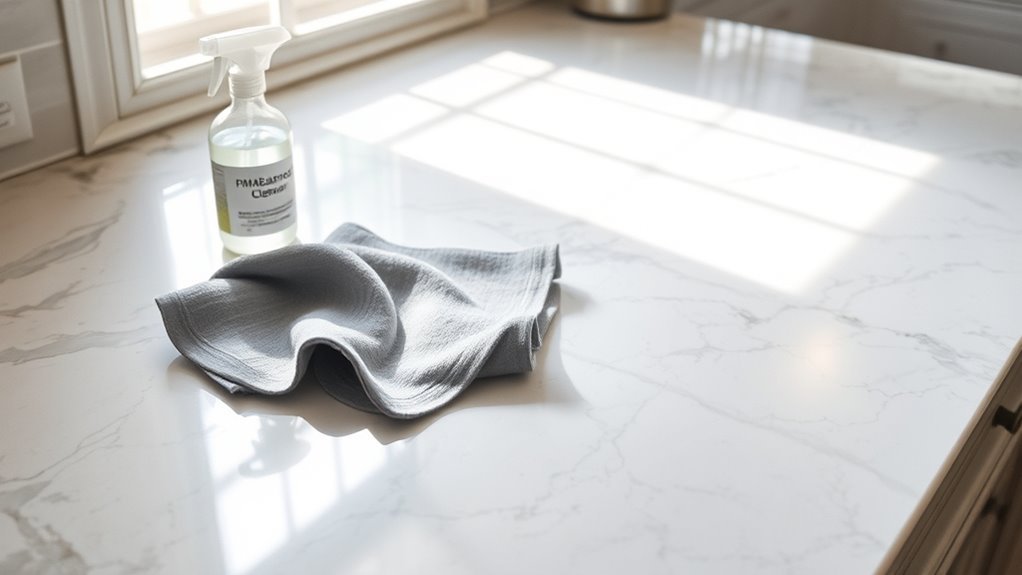
Although marble is prized for its elegant appearance, you should know that it’s a soft, porous stone that can easily stain, scratch, or etch if not properly cared for. Understanding marble composition is key to mastering marble care. Marble mainly consists of calcite, a mineral sensitive to acids and abrasives, which means spills from lemon juice or vinegar can quickly damage its surface. Since marble is porous, liquids can seep in and cause stubborn stains, robbing you of that pristine look you cherish. To enjoy the freedom of using your marble countertops without worry, you need to be mindful of how you treat them daily. With the right approach to marble care, you’ll protect your counters while keeping their natural beauty intact.
Essential Cleaning Supplies for Marble Countertops
When cleaning your marble countertops, it’s important to choose gentle cleaners that won’t damage the surface. You’ll also want to use soft cloths or microfiber towels to avoid scratches. These supplies help keep your marble looking beautiful without causing harm.
Gentle Cleaners Selection
Since marble is a delicate natural stone, you’ll want to choose cleaners that are gentle yet effective. Opt for pH balanced cleaners specifically designed for marble to avoid etching or dulling its surface. Harsh acidic or alkaline products can damage your countertop, so steer clear of anything with vinegar, lemon, or bleach. If you’re committed to a greener lifestyle, eco friendly options are widely available and just as efficient. These cleaners protect both your marble and the environment, giving you peace of mind while maintaining freedom from harmful chemicals. By selecting the right gentle cleaner, you can keep your marble countertop looking pristine without sacrificing the health of your home or the planet. Remember, the key is balance—effective cleaning without harshness.
Soft Cloth Types
Choosing the right cleaner is just one part of protecting your marble countertop—using the proper cloth is just as important. When it comes to soft cloth types, microfiber cloths are your best friend. They’re gentle yet effective, trapping dust and dirt without scratching the marble’s surface. Plus, they’re reusable and easy to wash, giving you freedom from wasteful disposables. Cotton rags also work well, especially if you want a more natural option. Just make sure they’re soft and clean, as rough or dirty fabrics can damage your marble. Avoid abrasive materials or anything with loose fibers that might leave residue. By picking the right cloth—microfiber or cotton—you’re ensuring your marble stays pristine while enjoying the ease and freedom of hassle-free cleaning.
Step-by-Step Guide to Daily Cleaning
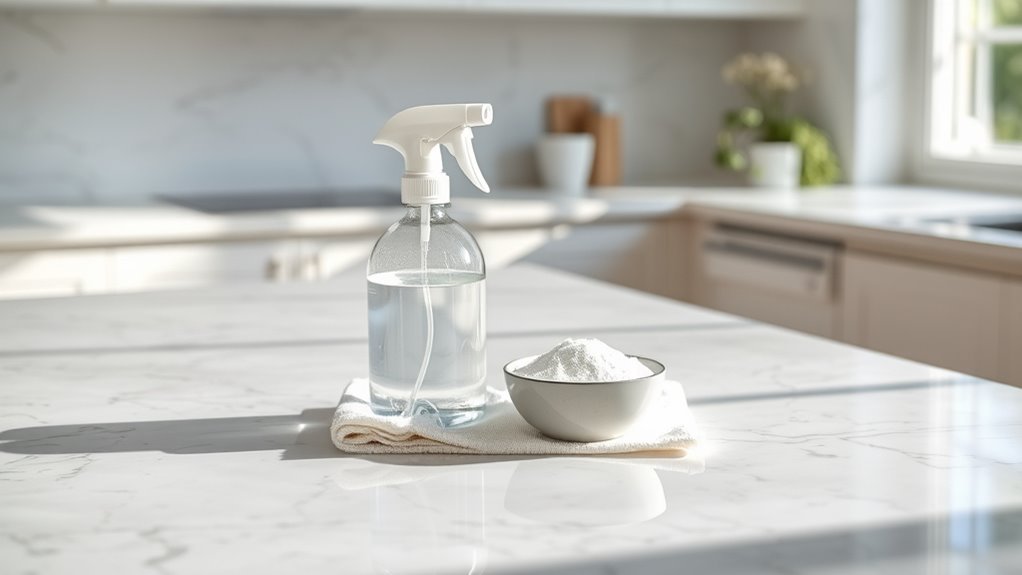
To keep your marble countertops looking their best daily, you’ll want to use the right cleaning supplies and techniques. Start with a soft cloth and a gentle, pH-neutral cleaner specifically made for marble. By following simple steps, you can prevent damage and maintain that beautiful shine every day.
Essential Cleaning Supplies
You’ll need just a few essential cleaning supplies to keep your marble countertops spotless every day. Start with a soft microfiber cloth or sponge—these won’t scratch your marble’s delicate surface. Next, grab a pH-neutral cleaner or make your own effective cleaning solution by mixing warm water with a few drops of gentle dish soap. Avoid anything acidic or abrasive, as these can damage your stone. Having a spray bottle handy lets you apply your solution evenly without wasting product. Finally, keep a dry, soft towel nearby to wipe down your counters after cleaning and prevent water spots. These marble maintenance tips guarantee you maintain freedom from stains and dullness while preserving your countertops’ natural beauty effortlessly.
Proper Cleaning Techniques
While marble countertops are stunning, they require careful cleaning to keep their shine intact. For proper marble care, start by wiping your countertops daily with a soft cloth dampened with warm water. Avoid harsh chemicals; instead, use a gentle pH-neutral cleaner designed for marble. When spills happen, clean them immediately to prevent stains or etching. Maintain a consistent cleaning frequency—daily light cleaning plus a weekly deeper wipe-down guarantees your marble stays beautiful without damage. Always dry the surface thoroughly after cleaning to avoid water spots. By sticking to these simple steps, you protect your marble’s natural elegance and enjoy the freedom of a flawless countertop every day. Remember, consistent care is the key to preserving marble’s timeless beauty.
Removing Stains From Marble Surfaces
Dealing with stains on marble surfaces can be tricky, but understanding the type of stain is the first step to effective removal. Different stains call for specific stain removal techniques, so knowing the common stain types helps you act fast and smart.
| Stain Type | Cause | Recommended Removal Technique |
|---|---|---|
| Organic | Coffee, wine | Use a poultice with baking soda |
| Oil-based | Grease, cosmetics | Apply acetone or detergent |
| Rust | Metal contact | Use a commercial rust remover |
| Etching | Acid spills | Light polishing, avoid harsh acids |
How to Avoid Damage While Cleaning
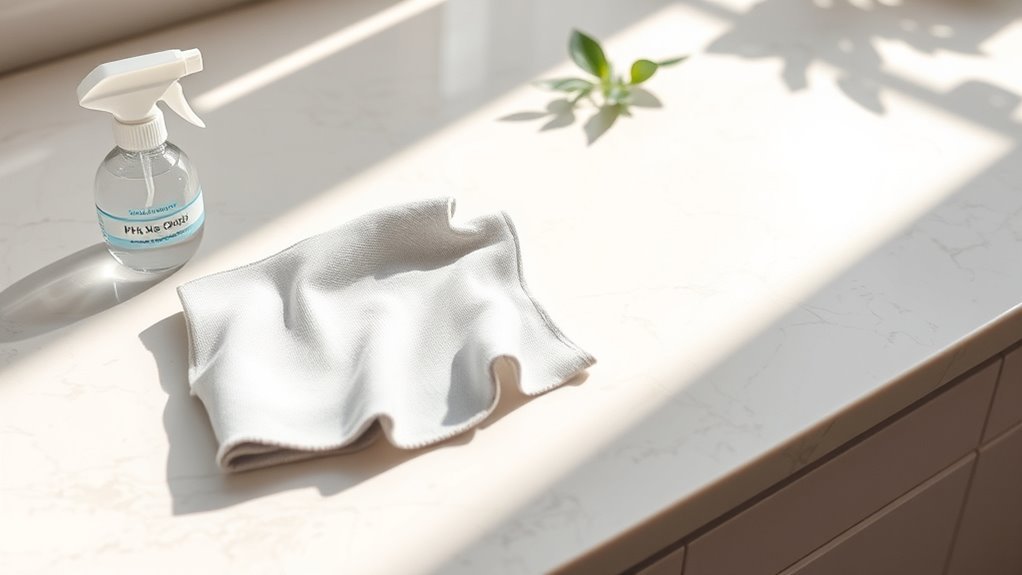
Although marble is durable, it’s sensitive to certain cleaning methods that can cause lasting damage. To protect your countertops, stick to gentle, pH-neutral cleaners and avoid acidic or abrasive products. Preventative maintenance is your best friend—wipe up spills immediately to prevent etching and stains. Don’t overdo it either; maintaining a balanced cleaning frequency keeps your marble fresh without stripping its natural shine or causing wear. Use soft cloths or sponges instead of rough scrubbers, and never pour harsh chemicals directly on the surface. By treating your marble with care and staying consistent with light cleaning, you’ll preserve its beauty and enjoy the freedom of worry-free upkeep. Your countertop deserves respect, so keep it safe and stunning for years to come.
Techniques for Polishing Marble Countertops
If you want your marble countertops to gleam like new, polishing is key. You’ll find various polishing methods that suit your style and time. Buffing techniques can bring out the marble’s natural shine without harsh chemicals. Whether you prefer manual or powered methods, consistent care guarantees a lasting glow.
| Polishing Method | Tools Needed | Best For |
|---|---|---|
| Hand Polishing | Soft cloth, powder | Small areas, touch-ups |
| Electric Buffer | Buffer machine | Large surfaces |
| Wet Polishing | Water, polishing pads | Deep scratches |
| Marble Polish | Commercial polish | Quick shine |
| Microfiber Buff | Microfiber cloth | Daily maintenance |
Choose your technique, stay consistent, and enjoy the freedom of a radiant marble surface.
Using Natural Remedies for Marble Shine
When you want to brighten your marble countertops without harsh chemicals, natural remedies offer a safe and effective alternative. You can use vinegar solutions diluted with water to gently clean and restore shine, but be cautious since pure vinegar is acidic and can damage marble if used undiluted. After cleaning, applying natural oils like olive or mineral oil helps enhance the surface’s luster and adds a protective layer. Simply rub a small amount onto the countertop with a soft cloth, then buff it to a subtle, natural shine. These simple, natural options let you maintain your marble’s beauty while embracing freedom from synthetic products. Just remember to test any remedy on a small, hidden spot first to verify it suits your marble type.
Preventative Measures to Protect Your Marble
To keep your marble countertops looking pristine, you’ll want to adopt some simple preventative measures that reduce wear and damage over time. Start by applying quality marble sealants—these create a protective barrier that guards against stains and etching without restricting your countertop’s natural beauty. Make sealing a routine part of your care, ideally every six to twelve months, depending on usage. Regular maintenance is key: clean spills immediately with a soft cloth and mild soap to prevent permanent marks. Avoid harsh chemicals, acidic foods, and abrasive scrubbers that can dull or damage the surface. By committing to these straightforward steps, you’ll guarantee your marble stays elegant and free, letting you enjoy both its timeless charm and your kitchen’s open, inviting vibe without worry.
Frequently Asked Questions
Can Marble Countertops Be Repaired if They Crack or Chip?
Oh sure, because who doesn’t want a perfectly cracked or chipped marble countertop as a centerpiece, right? Luckily, you don’t have to live with those imperfections forever. With proper crack repair and chip restoration, you can reclaim your countertop’s original glory. You’re free to restore that elegant surface without settling for less. Just remember, a little care and expert touch can make your marble look as flawless as the day it was installed.
How Often Should Marble Countertops Be Sealed?
You should stick to a sealing frequency of about every 6 to 12 months to keep your marble countertops protected. This helps prevent stains and damage, giving you the freedom to use your space without worry. As part of maintenance tips, regularly check if water beads up on the surface—if it soaks in, it’s time to reseal. Staying on top of this keeps your marble looking fresh and durable, letting you enjoy its natural beauty.
Are There Specific Cleaning Products to Avoid on Marble?
You’ll want to avoid acidic or abrasive cleaning solutions when it comes to marble maintenance. Products with vinegar, lemon, or ammonia can etch the surface, dulling its shine and damaging the stone. Instead, stick to pH-neutral cleaners specifically designed for natural stone. This way, you can keep your marble looking fresh and vibrant without worrying about harming it, giving you the freedom to enjoy its beauty without constant upkeep stress.
Can Marble Countertops Be Used Outdoors Safely?
Thinking of turning your marble countertop into an outdoor throne? Sure, if you enjoy living on the edge! Marble’s outdoor durability is about as reliable as a sunbather in a blizzard—temperature sensitivity means it can crack or stain easily. If you crave freedom, maybe let marble stay inside where it’s safe from weather mood swings. Otherwise, go ahead—just don’t say we didn’t warn you about nature’s harsh love affair with marble!
What Is the Best Way to Remove Etching Marks From Marble?
If you want to get rid of etching marks on your marble, etching removal starts with gentle polishing techniques. You’ll need a marble polishing powder or cream—rub it in with a soft cloth, working in circular motions. Don’t rush; take your time to restore that smooth finish. For deeper etches, a professional might be your best bet. With patience, you’ll free your marble from those pesky marks and keep it looking flawless.
